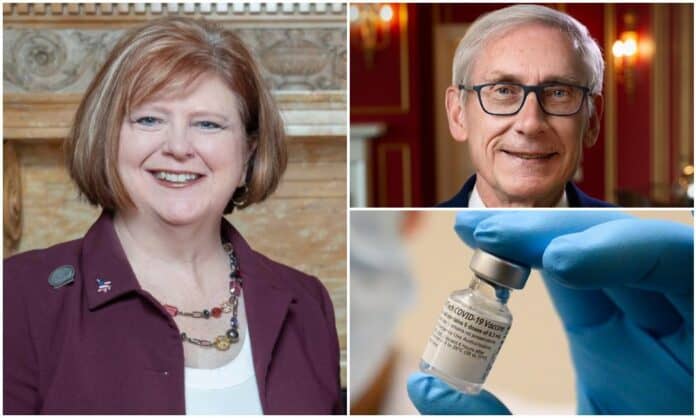What I learned after listening to stakeholders & testimony in the Assembly Committee on Health
By Representative Barbara Dittrich
In an extremely polarized age, most Americans can agree that the past year has been wearying, to say the least. The stress of an election year and racial strife were deeply magnified by the restrictions and lockdowns involved in the COVID-19 pandemic. Smiles have been in short supply, not only because they have been covered by masks but because of pervasive irritability resulting from the virus and all its byproducts. There is a deep, bone-aching craving to return to normalcy at any level.
When the nation learned that, despite all of the mocking detractors declaring it impossible, vaccinations would become available before the end of 2020, there appeared to be a glimmer of hope. Frontline workers breathed a collective sigh of relief, looking to this new tool to add to their protection on the job. Those with an elderly loved one brightened at the notion of finally being able to be reunited in-person.
As states filed their vaccination plans with the federal government in late 2020, the sad news quickly made its way to the Wisconsin State Legislature that our state had one of the worst, weakest plans filed. In an attempt to remedy that challenge quickly, the State Assembly proposed to Gov. Evers in a possible COVID relief package the notion of the Legislature having oversight of vaccine administration. As he has with so many other attempts to work with him as a team, the Governor balked at the notion saying that the proposal didn’t, “pass the smell test.”
Fast forward to January of 2021 and the Governor’s rebuff has left our state with one of the worst rankings in the Midwest on distribution of the COVID-19 vaccine. Nationally, Wisconsin was ranked 39th in the country on its rollout. Administration to individuals in the 1A group has been slow, while complaints to legislators have been high.
I began hearing complaints from stakeholders in the 1A group in late 2020, frustrated that weeks had passed without hearing anything from Wisconsin’s Department of Health Services (DHS) about moving forward with vaccination. One stakeholder had sent over 50 e-mails with no response. Reports began to come out of how little of the vaccine actually delivered to the state was getting into the arms of those who wanted it. To date, only 47% of the vaccine that has been received by the State of Wisconsin has actually made it to the intended recipients. And the Governor’s advisory committee continues to quibble over who should be in the next group for administration.
Thankfully, the Assembly wasted no time in holding a public hearing on Thursday, January 14th to get at the heart of the matter and expose where the problems are in Wisconsin’s vaccination delivery. In addition to continuing to speak privately with stakeholders in my district, I listened to 5 hours of testimony regarding where we are at.
Here is what I learned:
- Much like Wisconsin’s unemployment insurance debacle, it would appear that DHS failed to plan for the vigorous demand inevitable with the vaccine and hire more help or extend more work hours to ramp up the approval-to-administration pipeline. This has resulted in weeks between counties and other vaccinators hearing back from the state after they are approved to administer the vaccine. This is in addition to the weeks they are already waiting for the initial approval.
- As seems to be the culture of the Evers Administration, no responsibility is taken for any mistakes or delay in resolution of problems. At Thursday’s hearing, Assistant Deputy Secretary Lisa Olson remained unapologetic and unmoving in her defense of the DHS rollout. She offered platitudes like, “Believe me. We want this vaccine out to people as badly as you do,” as if DHS were powerless to do anything to improve the situation. She also defended the undue delays caused by the advisory board and the lack of a person at DHS where “the buck stops here” in decision-making regarding the vaccination.
- Through the excellent testimony of others on Thursday, we learned that the Administration could have expedited this process simply by having a universal means for individuals to register for their vaccination before it was administered. At this point, counties and other vaccinators may be using platforms that do not comply with HIPPA regulations just so they can get people signed up to receive the vaccine.
- Wisconsin has 1,200 new vaccinators approved to administer the vaccine, but we have no idea how that compares to our surrounding states that are doing a far better job at distribution. Other states are even allowing small pharmacies to distribute vaccines right now.
- The federal government is only letting the state know weekly how much of the allocated doses of vaccination it will be receiving, which definitely creates challenges. Nevertheless, every state is experiencing that, so why is Wisconsin doing so much worse at delivery than our neighbors?
- Asst. Deputy Olson all but admitted that the state is preventing vaccinators from administering available doses to the 1B group, even if they have exhausted the number of 1A individuals who are registering. This is resulting in needed vaccine sitting unused, which is simply unacceptable at a time like this. As recommended by the Pharmacy Society of Wisconsin, Wisconsin should be opening up the 1B group now.
- Wisconsin has no solid plan to assure that second doses of the vaccine are administered in a timely fashion. Clearly, this is problematic.
- As recommended by the Wisconsin Hospital Association, DHS needs to get scaling for widespread distribution and getting registration online NOW.
- Wisconsin needs to become much more nimble in its handling of the vaccination or we will continue to lag other states in administration. Our citizens rightly demand better of our government.
My hope is that the public will hold our government accountable given these revelations and the difficulties will be remedied in short order. We have all suffered long enough through the cruelty of this invasive virus.
About Representative Barbara Dittrich
Representative Barbara Dittrich (38th Assembly District) is a lifelong resident of Southeastern Wisconsin, currently living in Oconomowoc with her husband Steve and their three children, Lexi, Charlie and Sophie. She graduated from Hamilton High School – Sussex and attended the University of Wisconsin – Milwaukee.
After working in the investment industry for 13 years, Barbara founded a charitable non-profit serving the parents of children with disabilities and chronic illnesses. She served as the organization’s Executive Director for 15 years. Currently, she serves as Director of Advancement following a non-profit merger.
Barbara shares your priorities of keeping property taxes low, job opportunities high, schools safe, and pushing back government waste. Her lifetime experience also gives her a particular passion for issues such as mental health care, opioid abuse, medical costs, protecting life, and strong families.
Table of Contents














![WATCH: Elon Musk Town Hall Rally in Green Bay [FULL Video]](https://www.wisconsinrightnow.com/wp-content/uploads/2022/04/Elon_Musk_3018710552-356x220.jpg)



![The Wisconsin DOJ’s ‘Unlawful’ Lawman [WRN Voices] josh kaul](https://www.wisconsinrightnow.com/wp-content/uploads/2025/03/MixCollage-29-Mar-2025-08-48-PM-2468-356x220.jpg)















